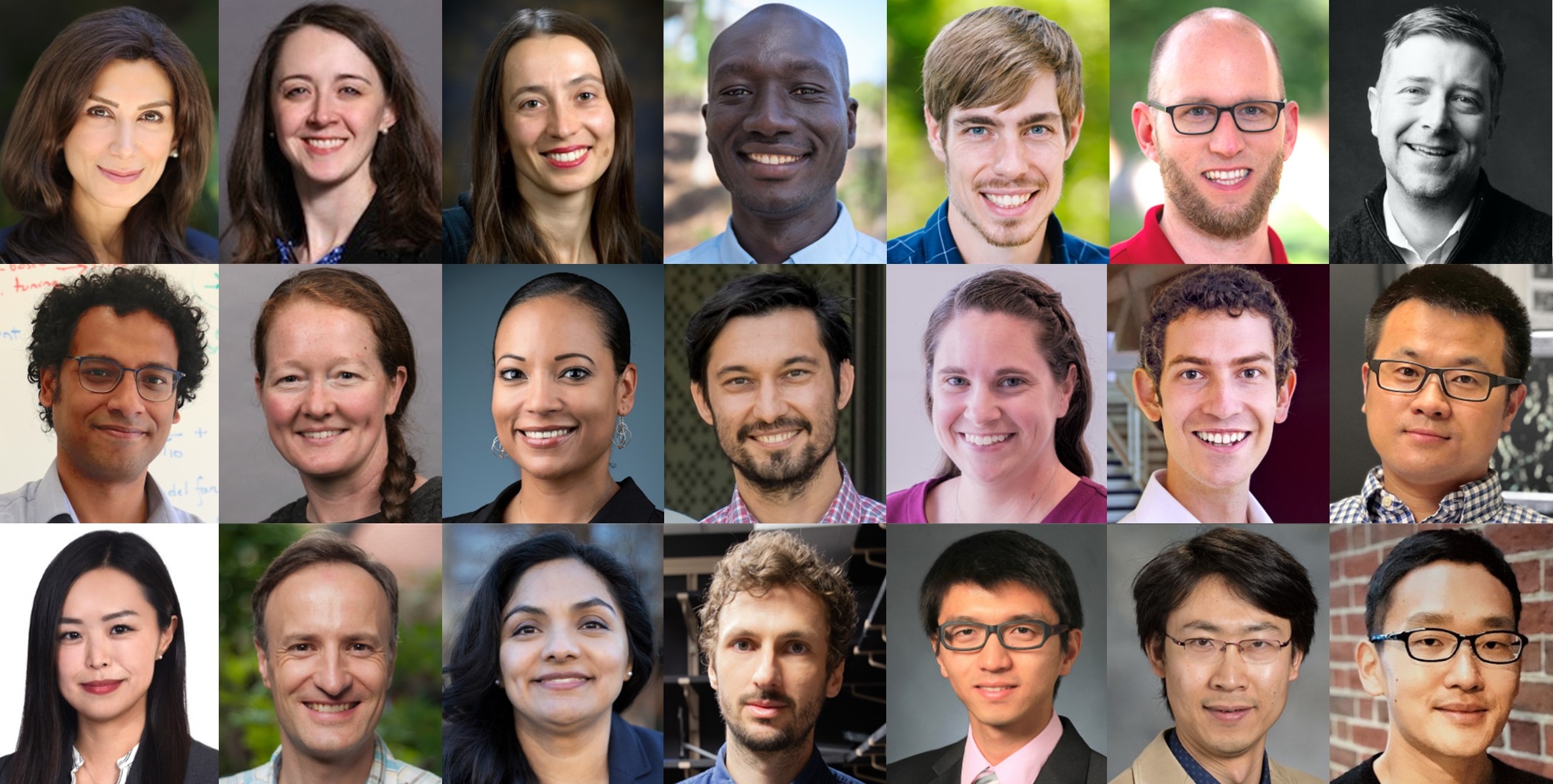Ten Team Projects Awarded Funding in Second Year of Scialog: Advancing BioImaging

Top row: Shiva Abbaszadeh, Heather Whitney, Yevgenia Kozorovitskiy, Abdoulaye Ndao, Joshua Brake, Kevin Cash, Mark Sellmyer. 2nd row: Arnab Mukherjee, Kathryn Keenan, Crystal Rogers, Ulugbek Kamilov, Alexandra Walsh, Johannes Schöneberg, Ying Hu. 3rd row: Seunghyun (Seu) Sim, Arnold Hayer, Rosario Porras-Aguilar, Luke Mortensen, Huanyu Cheng, Stephen Yi, Ruixuan Gao.
Ten multidisciplinary research teams will receive a combined $1,180,000 in funding from the Research Corporation for Science Advancement (RCSA), the Chan Zuckerberg Initiative, the Frederick Gardner Cottrell Foundation, and Walder Foundation in the second year of Scialog: Advancing BioImaging, an initiative that aims to accelerate the development of the next generation of imaging technologies.
The 21 awards, for projects led by early career researchers representing institutions across the U.S. and Canada, are for $50,000 each in direct costs.
“Multidisciplinary collaborations create synergies that spark new ideas,” said RCSA President & CEO Daniel Linzer. “In the same way, funding organizations investing in forward-thinking projects like these can work together to expand the horizons of knowledge.”
Scialog is short for “science + dialog.” Created in 2010 by RCSA, the Scialog format supports research by stimulating intensive interdisciplinary conversation and community building around a scientific theme of global importance. Teams of two to three Fellows who have not previously collaborated compete for seed funding for high-risk, high-reward projects based on the innovative ideas that emerge at the conference.
Advancing BioImaging, held May 19-22, 2022, in Tucson, Arizona, was the first in-person conference RCSA had hosted since 2019. The meeting brought together 45 early career chemists, physicists, biologists, bioengineers, and medical imaging specialists.
Keynote speakers Brian Pogue, University of Wisconsin-Madison, and Jenn Prescher, University of California, Irvine, set the stage for discussion with talks about their research, current tools and needed breakthroughs in imaging, and what they believe are promising areas ripe for discovery. Also serving as discussion facilitators were: Agata Exner, Case Western Reserve University; Maryellen Giger, University of Chicago; George Langford, Syracuse University; Kristen Maitland, Texas A&M University; Brad Smith, University of Notre Dame; and Jin Zhang, University of California, San Diego.
During the open and enthusiastic discussions that followed, participants developed new research ideas to bridge their different expertise, methods, and technologies in new ways to enable major advances in bioimaging. They wrote and pitched their proposals at the conference.
The 2022 awards for collaborative projects from the Advancing BioImaging initiative will support the work of these researchers at their respective institutions:
Shiva Abbaszadeh, Electrical and Computer Engineering, University of California, Santa Cruz *
Heather Whitney, Radiology, University of Chicago *
Real-time AI for Programmable Training Arrays
Yevgenia Kozorovitskiy, Neurobiology, Northwestern University †
Abdoulaye Ndao, Electrical and Computer Engineering, Boston University ^
Making Lenses Smart for Optical Imaging and Beyond
Joshua Brake, Engineering, Harvey Mudd College *
Kevin Cash, Chemical and Biological Engineering, Colorado School of Mines *
Democratizing Access to Macroscopic Bioimaging
Mark Sellmyer, Radiology, University of Pennsylvania *
Arnab Mukherjee, Chemical Engineering and Biological Engineering, University of California, Santa Barbara *
Improving MRI Detection Limits
Kathryn Keenan, Applied Physics Division, National Institute of Standards and Technology ^
Crystal Rogers, Anatomy, Physiology, and Cell Biology, University of California, Davis ^
Ulugbek Kamilov, Computer Science and Engineering, Washington University in St. Louis ^
MRI with Molecular Specificity for a New Realm of Neurodevelopmental Research
Alexandra Walsh, Biomedical Engineering, Texas A&M University, College Station *
Johannes Schöneberg, Pharmacology and Chemistry & Biochemistry, University of California, San Diego *
4D Imaging and Tracking to Resolve Organelle Form vs. Function
Ying Hu, Chemistry, University of Illinois at Chicago ^
Seunghyun (Seu) Sim, Chemistry, University of California, Irvine ^
Live tissue Clearing of Lymph Nodes Through Programmed Dendritic Cells
Arnold Hayer, Biology, McGill University ^
Rosario Porras-Aguilar, Physics & Optical Sciences, University of North Carolina at Charlotte ^
High-speed 4D Morphodynamic Analysis of Migrating Cells
Luke Mortensen, Regenerative Bioscience Center & School of Chemical, Materials and Biomedical Engineering, University of Georgia *
Huanyu Cheng, Engineering Science and Mechanics, Pennsylvania State University *
Transforming Imaging Collection in the Brain
Stephen Yi, Biomedical Engineering & Oncology, University of Texas at Austin ^
Ruixuan Gao, Chemistry and Biological Sciences, University of Illinois at Chicago †
In Situ Protein Sequencing by Multiplexed Real-Time Single Molecule Imaging
* Funded by CZI
^ Funded by RCSA/FGCF
† Funded by Walder Foundation
Scialog: Advancing BioImaging Fellows and Facilitators will convene again in Tucson on May 18-21, 2023, for the third year of this initiative to discuss progress and compete for another round of funding.
About RCSA: Research Corporation for Science Advancement is a private foundation that funds basic research in the physical sciences (astronomy, chemistry, physics, and related fields) at colleges and universities in the United States and Canada. Since 1912, it has supported research independently proposed by college and university faculty members, convened conferences, and actively advocated for science advancement.
About CZI: The Chan Zuckerberg Initiative was founded in 2015 to help solve some of society’s toughest challenges — from eradicating disease and improving education, to addressing the needs of our communities. Through collaboration, providing resources and building technology, our mission is to help build a more inclusive, just and healthy future for everyone. For more information, please visit chanzuckerberg.com.
About the Frederick Gardner Cottrell Foundation: Research Corporation Technologies established the Frederick Gardner Cottrell Foundation in 1998 to provide financial support for scientific research and educational programs at qualified nonprofit organizations.
About Walder Foundation: The Walder Foundation was established by Joseph and Elizabeth Walder to address critical issues impacting our world. The Foundation’s five areas of focus — science innovation, environmental sustainability, the performing arts, migration and immigrant communities, and Jewish life — are an extension of the Walders’ lifelong passions, interests, and their personal and professional experiences.





